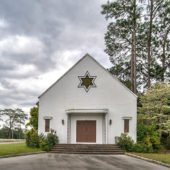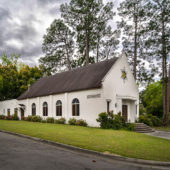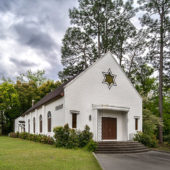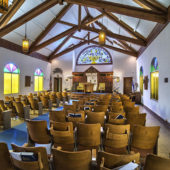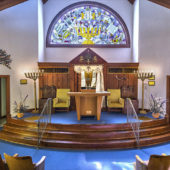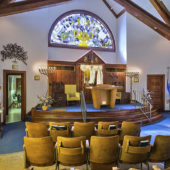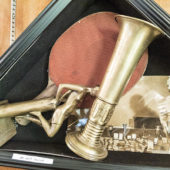A small but close-knit congregation in rural Georgia.
The first Jews to settle in Waycross arrived in the early 1900s. According to the 1912 city directory there were 18. In 1924 thirteen Jewish men organized a congregation with services being held in a rented building in downtown Waycross. Out of the twenty families that were charter members, there are three families that still have heirs in the community today.
By 1937 the town’s Jewish population had grown to 47 and construction of a synagogue was discussed but ultimately delayed because of the Great Depression and then World War II. In 1952 a synagogue was built with seating for 100. This building also has a kitchen and meeting/dining room. Since that time, services are held each Friday evening with the services performed by a lay leader with oneg Shabbat observed after the services. Since the beginning, this has been a Conservative Synagogue with a kosher kitchen.
There is no Rabbi in Waycross, but Rabbis are available from Valdosta, GA and Savannah, GA when occasions arise. During the High Holidays, student Rabbis are sent from the Jewish Theological Seminary in New York.
In the synagogue’s social hall there is a display case containing a ping pong paddle, trophies and associated memorabilia. Next to the display case there is a plaque which says:
“When Hitler began the Holocaust in Germany, there were many Jews that wished to leave the atrocities of Europe, but with no place to go. One couple was Paul and Stan Flussman. Times were rough, and although they were from very affluent families, they had to leave most prized possessions behind. Being the European champion in table tennis, Paul did smuggle out his paddle and a few of his many trophies and awards. Also, included, was a picture showing his honors.
The Waycross Hebrew Congregation was contacted by a Jewish organization in New York to see if we could relocate this couple. In 1939 there were over forty families in Waycross, Blackshear, Alma and Baxley and they offered their help. The community raised money to buy the Flussman’s a house on Parkway Dr. At that time, there was a shoe factory in Waycross owned by a Jewish family, and they provided Paul a job. Later, settling into the community, Stan began selling Avon products and became well known in this area. In her later life she became bedridden, but continued selling over the phone and having teenage girls package and make deliveries.
The Flussmans were a vital part of the Jewish community and he served many years as the secretary/treasurer of the Waycross Hebrew Congregation. Stan’s sister, Anna Feit, also immigrated here from France after the death of her husband. All of these courageous people are buried in the Jewish section of Oakland Cemetery.”

